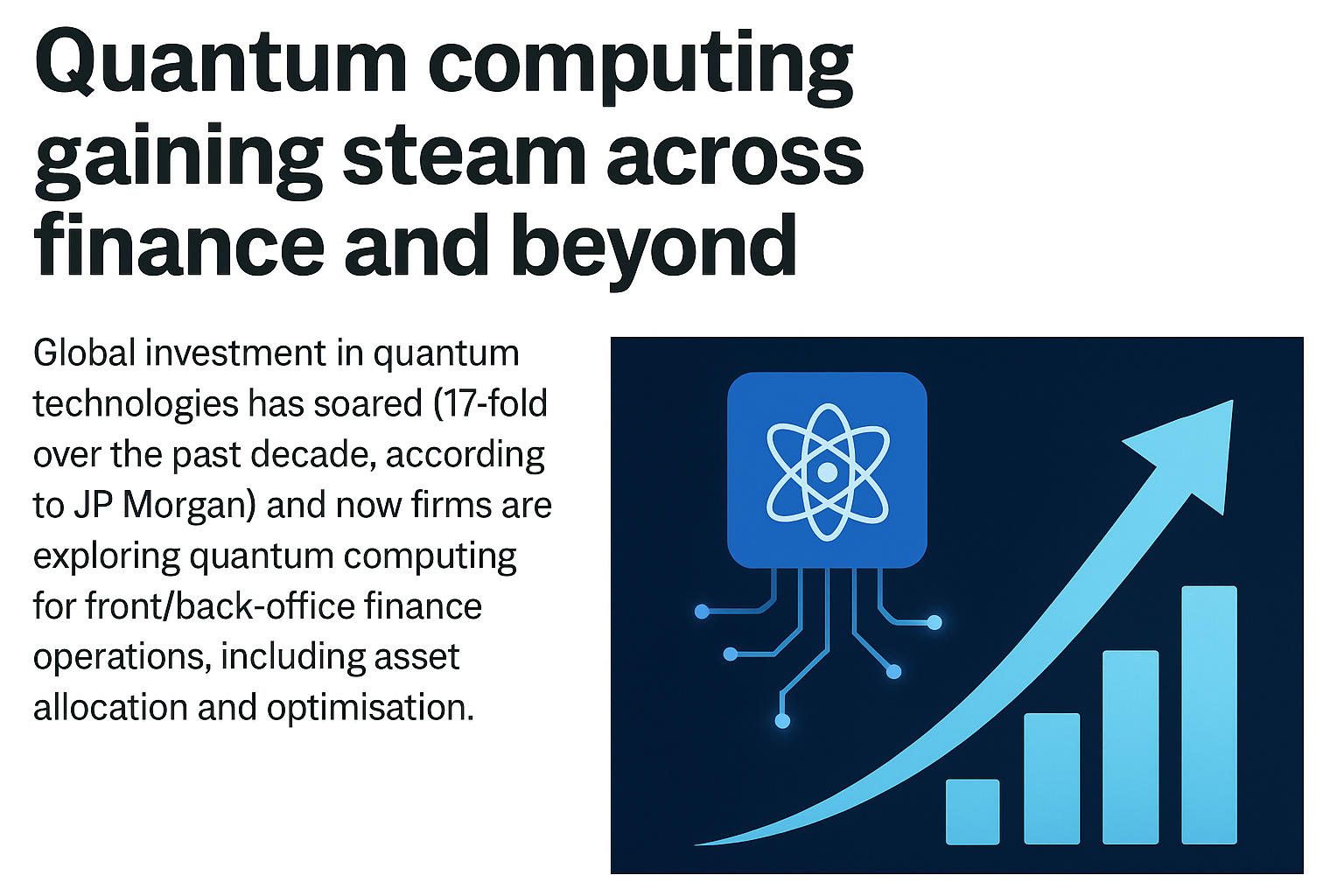Over the past decade, quantum computing has steadily evolved from theoretical promise to an emerging technological reality—one that industries around the world are now racing to understand and integrate. Nowhere is this momentum more visible than in global investment trends: according to JPMorgan, funding in quantum technologies has surged 17-fold in the last ten years. What was once a niche research area is rapidly becoming a strategic priority for major financial institutions, governments, and tech innovators.
Today, quantum computing is no longer just about scientific curiosity. It’s about competitive advantage.
Why Quantum, and Why Now?
Classical computers, even the most powerful supercomputers, struggle with certain categories of problems—particularly those involving vast numbers of variables and complex optimization landscapes. Quantum computers, on the other hand, use qubits to process information in ways that allow them to explore many possible states simultaneously.
This capability has sweeping implications:
-
Complex modelling and simulations
-
Risk analysis with vast datasets
-
Pattern recognition beyond classical limits
-
Optimization challenges previously too computationally expensive
With these strengths, it’s no surprise the financial sector is positioning itself early.
Finance Leads the Adoption Curve
Banks, hedge funds, and market infrastructure providers are exploring quantum computing across both front-office and back-office operations. JPMorgan Chase, one of the most vocal proponents of quantum adoption, suggests quantum systems could transform critical areas such as:
1. Asset Allocation & Portfolio Optimization
The financial markets are full of optimization problems: balancing risk, return, liquidity, and constraints across hundreds or thousands of assets. Classical methods rely heavily on approximations. Quantum algorithms—especially quantum annealing and hybrid quantum-classical solvers—offer new levels of precision and speed.
2. Risk Management & Scenario Simulations
Quantum computing can evaluate innumerable market conditions simultaneously, enabling more resilient stress tests, faster Monte Carlo simulations, and richer scenario modelling. As markets become increasingly complex and interconnected, this computational edge becomes invaluable.
3. Fraud Detection & Security
Quantum machine learning has the potential to detect subtle anomalies in gigantic datasets. At the same time, quantum-resistant cryptography is becoming a priority as quantum capabilities advance—ensuring that today’s financial systems remain secure in tomorrow’s quantum-enabled world.
4. Pricing Complex Financial Instruments
Derivatives with multiple underlying assets or non-linear payoffs require extremely heavy computation. Quantum computing promises to dramatically accelerate these calculations.
Beyond Finance: A Broader Technological Shift
While finance is one of the most active sectors experimenting with quantum technologies, the opportunities stretch far wider:
-
Pharmaceuticals: molecule simulation and drug discovery
-
Energy: grid optimization, materials research
-
Logistics: route optimization at massive scale
-
Climate science: high-resolution modelling
-
Manufacturing: advanced materials and predictive maintenance
The industries investing now may be the ones defining global competitiveness in the decades ahead.
Challenges Still Remain
Quantum computing is not a magic switch waiting to be flipped. Several challenges persist:
-
Hardware instability (qubit decoherence)
-
High error rates
-
Limited number of usable qubits
-
Need for hybrid systems (quantum + classical)
-
Lack of standardized programming frameworks
But as history has shown—from classical computing to mobile broadband—breakthrough technologies grow exponentially, not linearly.
The Road Ahead
Given the explosion in funding, accelerating corporate partnerships, and rapid improvements in hardware, the next five years will likely define the trajectory of quantum adoption globally. Financial firms are positioning themselves early because they understand the stakes: whoever first harnesses scalable quantum power will gain an edge in speed, accuracy, and decision-making.
Quantum computing isn’t simply “coming”—it’s already here, gaining steam, and quietly reshaping the future of finance and beyond.
If the last decade was about building the foundation, the next decade will be about unlocking quantum advantage.




